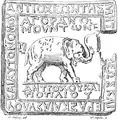Mene (unit)
The mĕnē (also mina, Aramaic) (Hebrew: מנה)[1] is an ancient Mesopotamian unit of weight for gold or silver and one of the earliest written words for money. The mĕnē, like the shekel, was also a unit of currency. In ancient Greece, it originally equalled 70 drachmae and later was increased to 100 drachmae.[2] The Greek word mna was borrowed from Semitic; compare Hebrew māneh, Aramaic mĕnē, Syriac manyā, Ugaritic mn, and Akkadian manū. However, before it was used as currency, a mene was a unit of measurement, equal to 567 grams. One mĕnē of gold would be worth $23,000 USD and one mĕnē of silver would be worth $300 USD at today's metal prices.
In folk language used by sailors, the word mina or mines came to mean "mines", indicating mineral resources extracted from the ground.
From earliest Sumerian times, a mĕnē was a unit of weight. At first, talents and shekels had not yet been introduced. By the time of Ur-Nammu, the mĕnē had a value of 1/60 talents as well as 60 shekels. The value of the mĕnē is calculated at 1.25 pounds[3][4] or 0.571 kilograms per mĕnē (18.358 troy ounces).
Evidence from Ugarit indicates that a mĕnē was equivalent to fifty shekels.[5] The prophet Ezekiel refers to a mĕnē ('maneh' in the King James Version) as sixty shekels, in the Book of Ezekiel.[6] Jesus of Nazareth tells the "parable of the mĕnē" in Luke 19:11-27.
From the Akkadian period, 2 mĕnē was equal to 1 sila of water (cf. clepsydra, water clock).
Menē Jewelry
In early 2016, noted gold investor Roy Sebag began to study and write about the global jewelry market which contributes the majority of the world's annual gold demand (2,000 tonnes)[7] far exceeding demand for gold investment coins. Following extensive travels to India, Asia, and Southeast Asia, Sebag recognized an opportunity in bringing the ancient tradition for jewelry being a store of enduring value and accessible savings to the West.
In October 2016, Sebag founded Mene Inc. a luxury online jewelry venture along with Diana Widmaier Picasso[8] the granddaughter of Pablo Picasso. Menē (meh-nay) derives its name from the ancient Mesopotamian unit of measurement, the Mene (unit) reflected 567 grams of pure gold and was one of the earliest written words for money. Menē designs, manufactures, and markets timeless 24 karat gold jewelry under the brand name Menē. The company retails its jewelry direct-to-consumer through a transparent and empowering online shopping experience. Through Mene.com, customers can buy, sell, and exchange their jewelry by weight at the prevailing daily price for gold as quoted on the international bullion markets. Menē is currently in closed private beta and will launch to the greater public in the fall of 2017.[9]
Historic Purchasing Power
- In the first century AD [in Greece?], it amounted to about a fourth of the wages earned annually by an agricultural worker.
Code of Hammurabi
- In the Code of Hammurabi which is arguably the first example of written law, mene is one of the most used terms denoting the weight of gold to be paid for crimes or to resolve civil conflicts.[10]
Selene Goddess of Time
The ancient Greek goddess Selene was also known by the ancient Greek term for moon "Mene". She was the goddess of the moon denoting the calendar or passage of time.
Images
 Mĕnē of Athens.
Mĕnē of Athens. Mĕnē of Chios.
Mĕnē of Chios. Mĕnē of Antiochus IV Epiphanes.
Mĕnē of Antiochus IV Epiphanes. Mĕnē of Antioch.
Mĕnē of Antioch.
References
- In the Hebrew tradition, a meh-ney had always the weight of 100 silver denarii.
- Aristotle, Athenian Constitution, 10.2
- Archived 2011-01-23 at the Wayback Machine Calculation of weight by number of shekels.
- Jewish Encyclopedia
- Tenney, Merril ed., The Zondervan Pictorial Encyclopedia of the Bible, vol. 5, "Weights and Measures," Grand Rapids, MI: Zondervan, 1976.
- Ezekiel 45:12
- =World Gold Council "WGC Report: Gold Demand Trends" Check
|url=value (help). Retrieved 24 June 2017. - Fickenscher, Lisa. "Here's your chance to finally own a Picasso". New York Post. Retrieved 23 June 2017.
- =Mene.com "Menē Website" Check
|url=value (help). Retrieved 24 June 2017. - Sacred Texts